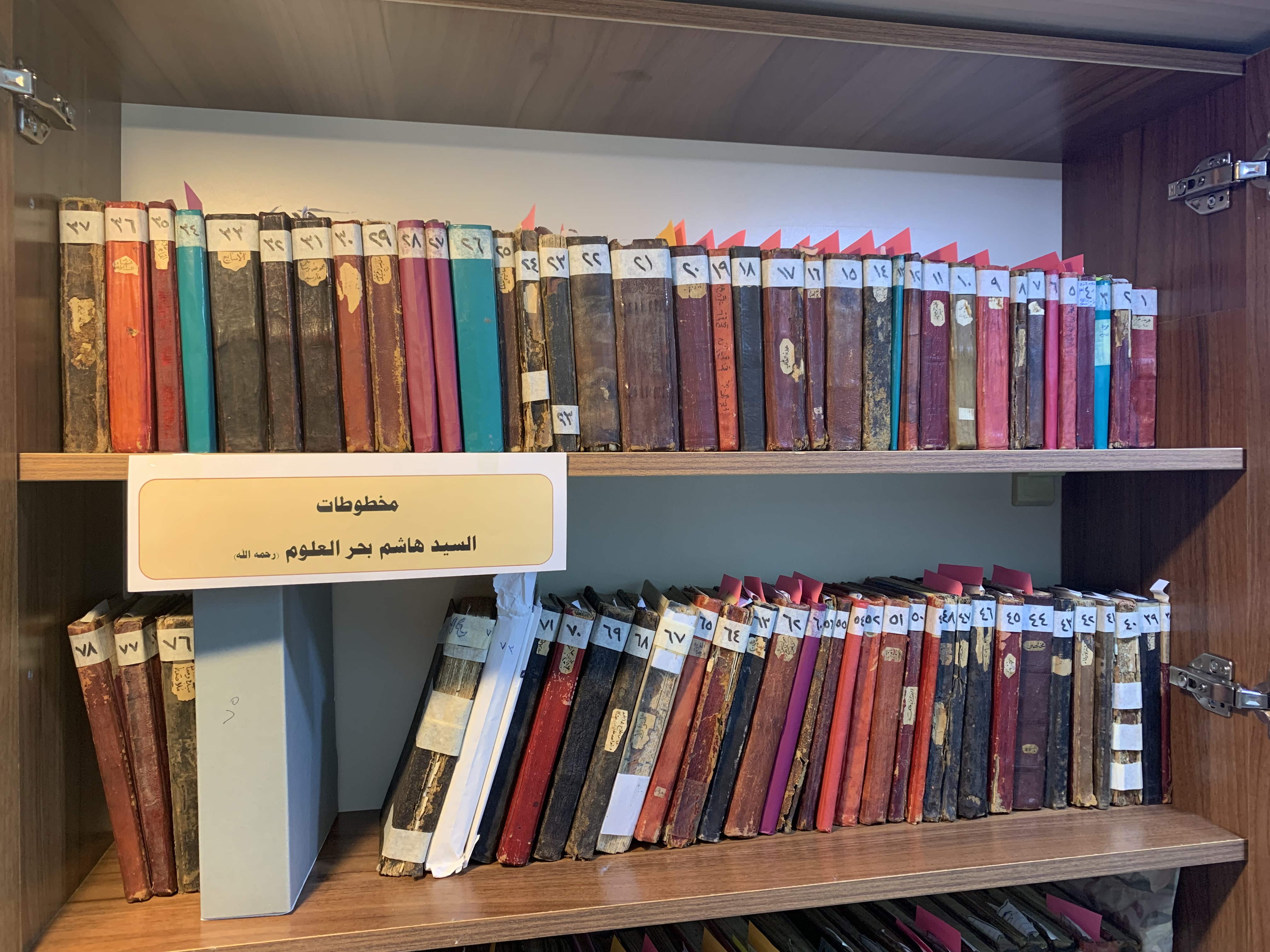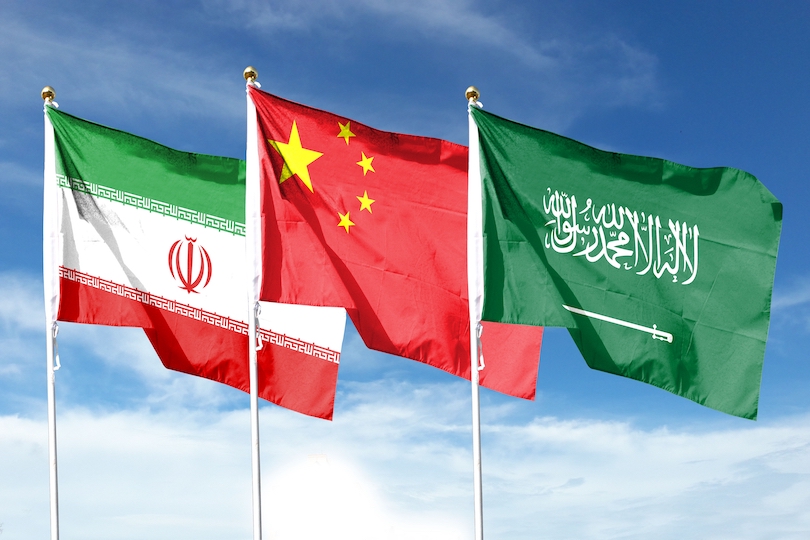Preserving Cultural Heritage: Cataloguing and Protecting the Manuscripts in the Sayyid Bahr al-Ulum Library in Najaf, Iraq
In the heart of Najaf, Iraq, lies a treasure trove of intellectual and cultural heritage – the Sayyid Bahr al-Ulum Library. This esteemed library holds within its walls a collection of manuscripts dating back centuries, offering invaluable insights into Islamic scholarship, theology, and history. However, this rich repository of knowledge faces numerous threats, from persecution and historical neglect to environmental degradation. Recognising the importance of safeguarding this cultural heritage, Mr Amir Mehdi and Prof Kirsten E. Schulze from the International History Department have spearheaded a collaborative project aimed at cataloguing and preserving the manuscripts of the Sayyid Bahr al-Ulum Library. Under their leadership the project seeks to address the urgent need for preservation firstly through meticulous cataloguing and assessment.
A collaborative effort is underway between the Sayyid Bahr Al-Uloom Heritage Center, the British Library, and the London School of Economics Department of International History to protect these precious manuscripts. The first stage of the project is nearing completion to create a digital catalogue and needs assessment survey for the library. At the heart of this stage of the project lies the challenging task of cataloguing each manuscript, which leads to a journey to unveil the secrets held within these ancient texts, meticulously documenting their titles, authors, and subject areas. Beyond cataloguing, the project also aims to address the pressing preservation challenges faced by the manuscripts. Through detailed condition assessments and collaboration with preservation experts, the team seeks to develop strategies to mitigate environmental threats and ensure the long-term survival of these invaluable cultural artifacts. Every effort is being made to safeguard this irreplaceable heritage for future generations.
Beyond preservation efforts, the project also emphasises capacity building and knowledge transfer. Through training sessions and consultations, local stakeholders are empowered with the skills and knowledge necessary for ongoing preservation efforts. By fostering collaboration and knowledge exchange, the project aims to create a sustainable framework for the continued protection and study of the Sayyid Bahr al-Ulum Library manuscripts.
Unveiling Centuries of Wisdom
The Sayyid Bahr al-Ulum Library boasts a diverse array of manuscripts spanning various disciplines. The modern library was formed by Sayyid Hashim Bahr al-Ulum (d. 1958) but was originally compiled by his father Ayatollah Sayyid Jafar Bahr al-Ulum (d. 1956). The core of the collection is the personal manuscript library of the Shi’a Muslim scholar Allamah Sayyid Muhammed Mehdi Bahr al-Ulum (d. 1797) and his children and grandchildren who themselves were scholars. The library offers a glimpse into the intellectual legacy of one of Iraq’s oldest Shia Muslim scholarly families of Iraq and the Shia Muslim world with a large contribution towards religion, politics, and society. With some manuscripts dating back as far as 700 years, and most ranging between 200-300 years old. Totalling approximately 1000 titles, this collection is a testament to centuries of intellectual inquiry and scholarly pursuit. The collection of manuscripts spans various subjects including Qurans and prayer books, works of Quranic exegesis, works on mathematics and astronomy, science/medicine, logic, metaphysics and gnosis, beliefs and jurisprudence, Prophetic sayings, history, poetry, and many other disciplines. The manuscripts also are in multiple languages ranging from Arabic to Persian and Ottoman Turkish. Furthermore, the documents contain key political and historical findings through the interaction with governments in the region by members of the Bahr al-Ulum family and their own interventions making it a treasure for researchers.
The library contains many unique pieces not found elsewhere and not researched properly before. The Bahr al-Ulum family is one of the oldest Shia scholarly families of Iraq and the Shia world with a large contribution towards religion, politics, and society. Apart from the manuscript collection, the library also had a famous library of 10,000 printed books, journals, and photographs but many of it is still lost possibly in other government storage facilities. The manuscripts in possession of the family are one of the most valuable and rare privately held collections in Iraq. The Ba’ath government executed, expelled, or imprisoned many members of the family due to their prominence. The sheer range of the collection itself makes it an invaluable resource for scholars and researchers interested not only in the history of Islam but also the wider networks and genealogies at play in Iraq and the region.
The Urgency of Preservation
Despite its historical significance, the Sayyid Bahr al-Ulum Library faces significant challenges that threaten the integrity of its manuscripts. During the Ba’ath party dictatorship in Iraq, the manuscripts were seized by the government and lost for approximately 50 years. The Bahr al-Ulum family believed these manuscripts to have been destroyed or lost due to the Ba’ath party’s campaign of cultural eradication against the Shia Muslim majority in Iraq at that time but were uncovered in a government storage warehouse in 2009 after the fall of Saddam Hussein. The manuscripts were previously stored in steel cupboards for approximately 50 years and because of the condition of the building that they were stored in, as well as the general weather in Iraq, suffered from extremes of hot and cold as well as high humidity. Furthermore, bookworms, silverfish and other pests have caused damage to some of the manuscripts amongst other damage. Many front and back pages have been stolen or lost, possibly due to mishandling, which makes identifying some texts difficult and time consuming.
Decades of political turmoil, including the seizure and concealment of the manuscripts during the pre-2003 Ba’ath regime, have taken a toll on their physical condition. Extremes of temperature and humidity, coupled with damage from pests and mishandling, have further compounded the preservation challenges. Without intervention, these priceless manuscripts risk being lost to the ravages of time and neglect.
A Beacon of Hope
In the face of adversity, the collaborative efforts to catalogue and protect the manuscripts of the Sayyid Bahr al-Ulum Library stand as a beacon of hope for cultural preservation. By documenting centuries of intellectual inquiry and scholarship, this project not only safeguards valuable cultural heritage but also opens avenues for scholarly research and academic exploration. Future endeavours for scholarly research incorporate uncovering the detailed history of the library, its contribution to society, the individuals associated with the library, and the contents of the individual manuscripts found within its collection. Through collaboration, dedication, and a shared commitment to preservation, we can ensure that these ancient manuscripts continue to inspire and enlighten generations to come. Together, we can make a difference in safeguarding our shared heritage for future generations.
Featured Image: Manuscripts from the Sayyid Bahr al-Ulum Library. Taken by the author.





